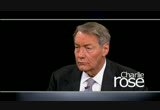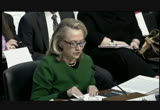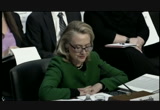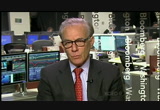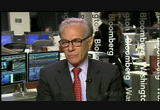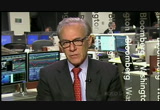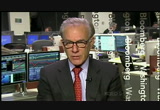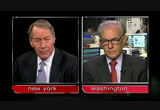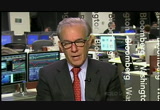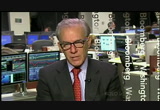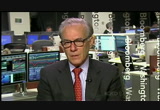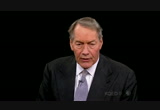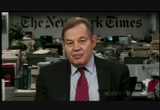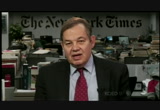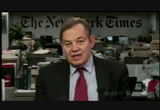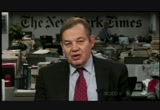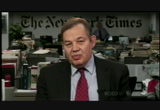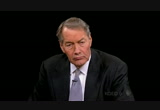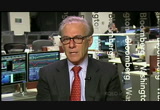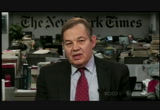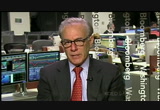tv Charlie Rose PBS January 24, 2013 12:00am-12:22am PST
12:00 am
12:01 am
captioning sponsored by rose communications from our studios in new york city, this is charlie rose. >> rose: we begin this evening with secretary of state clinton on capitol hill. lawmakers questions her earlier today about the september 11, 2012 attacks on the american consulate in benghazi, libya. four americans were killed that day, including ambassador christopher stevens. secretary clinton's testimony had been post toned until now. she took responsibility and emsized her commitment to improving diplomat security abroad. >> as i have mentioned many times i take responsibility and nobody is more committed to getting this right. i am determined to leave the state department and our country safer, stronger, and more secure. now, taking responsibility meant moving quickly in those first uncertain hours and days to respond to the immediate crisis, but, also, to further protect
12:02 am
our people and posts in high-threat areas across the region and the world. it meant launching an independent investigation to determine exactly what happened in benghazi and to recommend steps for improvement and it meant intensifying our efforts to cat combat terrorism and figure out effective ways to support emerging democracies in north africa and beyond. >> rose: she was overcome with emotion as she recalled receiving the bodies of the deceased service members. >> for me this is not just a matter of policy. it's personal. i stood next to president obama as the marines carried those flag-draped caskets off the plane at andrews. i put my arms around the mothers and fathers, the sisters and brothers, the sons and daughters, and the wives left alone to raise their children. >> rose: questions about the accuracy of the administration's initial depiction of the events elicited a heated response. >> the fact is we had four dead
12:03 am
americans. >> i understand. >> was it because of a protest or was it because of guys out fair walk one night who decided they'd go kill some americans. what difference at this point does it make? it is our job to figure out what happened and do everything we can to prevent it from everything happening again, senator. >> rose: secretary clinton's testimony today may be her last major appearance in a diplomatic role. she hands over the reigns to senator john kerry after his confirmation. joining me now from washington, david ignatius of the "washington post." later we'll talk to michael gordon of the "new york times." david, as you watched this today, did it answer all the questions? >> well, it was-- it was a very lively exchange. most of the answers in truth have come out in the details, the report by the accountability review board, and the systematic timeline that it offered. what today provided was the drama of secretary clinton and her final major appearance defending herself, defending the administration, and getting very
12:04 am
emotional and very feisty. and i think what we took away from this was how intense feelings are on both sides. the republicans really went after her today, and she-- she-- she pushed back hard. >> rose: did they, as they say,a lay a glove on her? >> well, i think on the basic issues here, benghazi, the republicans have a point. as the accountability review board report says, staffing for diplomat security was grossly inadequate. repeated requests came from benghazi for more diplomatic security officers to go to benghazi and guard that very ill-constructed compound. nothing happened. the decisions taken by the ambassador, who tragically died, chris stevens, were-- were-- were-- were unfortunate looking back. he shouldn't have been in benghazi in the way he was on that day, september 11.
12:05 am
and then finally, senator mccain stressed why wasn't there some u.s. military power available to come to the rescue of the people who were trapped in the embassy annex so that people wouldn't have ended up dying on the roof essentially unable to protect themselves against the mortar fire they were taking. and you could see, he's still angry about it. >> rose: the other thing he considered unacceptable was her response with senator johnson when she said, "what difference does it make?" >> i thought that was an especially poignant response from secretary clinton. and it reflected an uncertainty to this day, i'm told among intelligence officers who have reviewed the evidence they have of what happened that night, believing it or not, they still don't know precisely how that
12:06 am
attack came to happen. they know there were terrorists who were associated with al qaeda, were part of the group. they know there were others who kind of wandered into the scene. and when secretary clinton said, "what difference does it make exactly how it came together, let's find it and punish them." she was speaking out of frustration but also out of this uncertainty that's in the intelligence itself. >> rose: there is also this notion that secretary clinton did not read a cable, which she acknowledged. >> well, she-- she, she said that the requests that came in for more diplomatic security in benghazi had not come to her attention. she said that that's ordinary standard procedure for it to be handled at lower levels, but the buck stops with her. what happened in benghazi showed that the state department wasn't taking security seriously enough. four people ended up losing their jobs because of it. the republicans have wanted to
12:07 am
take accountability to a higher level-- namely, to secretary clinton-- and they had their chance to do taid to do it, at least rhetorically. >> rose: there was a question of whether they were fired or whether they were simply suspended. what's the right answer? >> yes, there's a technical detail. it varies with the different people precisely what it was. but it was not as emphatic as the republicans would like to say. they had like to see more scalps, if you will. they'd like to see people punished in a more visible way and accountability go higher. >> rose: do you have any sense that the secretary wanted to avoid this? my imtregz pregz was she knew it was out there and she might have been eager to come in and make her case, and fully in front of the american people, as well as those members of the house and senate, that she took responsibility and they planned to implement the reforms, giving her a forum to say what she said separately but in different places.
12:08 am
>> she came prepared today to be very aggressive in defending herself and the department. i thought she looked clearly as if she'd recovered from the-- the-- the-- the fall that she'd had and the-- the -- >> rose: cop cushion. >> the concussion that she'd had. she looked good. she was very aggressive and emphatic. it was long testimony before the two senate and house. did she look forward to a chance to defend herself? i can't imagine this would have been the way she would have chosen to leave, the most visible thing before the american public before she leaves after what many, even many critics have said was a distinguished period as secretary of state. she leaves under a bit of a cloud with the republicans really coming after her. i've wondered, carl are charlie was bloody the secretary a little bitn anticipation she's going to be a candidate in 2016,
12:09 am
and they're going to lay down this marker that as secretary of state she may have done a lot of good things, but on her record is benghazi. >> rose: what did she accomplish as secretary of state? >> well, first, i think she did the basic job of representing the united states abroad tirelessly and well. she was very good in public forums. she would-- when she visited countries like pakistan, meet with audiencees, take questions, be very visible. as secretary, she did not have a record of substantial negotiation-- a la henry kissinger, jim baker. it's hard to find things like that on in her record, but on representational side, very strong performance. also in terms of being loyal to president obama. the obama white house was concerned in the beginning, that
12:10 am
this superstar, part of team clinton, was going to over-shadow the president and the white house. they were very controlling sometimes in how they methods foreign policy, but secretary clinton never stepped on anybody's toes. she always left it to the president to take the lead on things. so i think that was a sign that she was a team player. i find, charlie, more people from both parties today saying that they thought she did a good job, and that she showed that she has real depth. then you would have found four years ago. >> rose: clearly it enhanced her reputation. >> i think so. >> rose: when you look forward to the service of john kerry, assuming what most people believe the obvious confirmation because he's of the senate himself, will he be a different secretary of state? >> would expect, charlie, that you'll see a little bit more of the back-channel negotiating style that we associate with a kissinger or jim bake frer
12:11 am
senator kerry. he thinks that we need a period of quiet can diplomacy to explore options, to see if there's some way to negotiate some kind of deal over the nuclear issue with iran, to explore some way with russia to get a negotiated political transition in syria. and i think he is a believer i in-- in the back-channel side of being secretary of state. so that will be a different tone. he's also going to be like senator clinton, a well-known, kind of, you know, former presidential level candidate for the united states. >> rose: we continue our conversation about the hearings today in washington request are with michael gordon of the "new york times." michael, you know secretary clinton and you also know senator kerry who is likely to be confirmed as secretary of state. will there be a difference? i think there will be a lot of
12:12 am
continuity on substance. she had a persona as a global figure and a certain degree of charisma that i think she'l he'll lack. and she did play a role as the obama administration would assert in restoring the american image, but i think there will be more points of continuity than discontinuity. >> rose: how do you assess her four years? >> >> well, i think she was good at restoring the american image. i think she trafd a lot. she went to 112 countries. i think she had some success in asia. but i don't think she or the obama administration has many notable diplomatic accomplishiments. the syria problem is-- seemed. the middle east situation seems pretty much stalled out.
12:13 am
can. >> rose: do you believe benghazi will be a cirrus law on her record? >> i think it is a flaw. but i don't think it will be a lasting flaw. it was a systemic breakdown. there was an independent review that established there was a lot of culpability of a lot of people on the sixth floor of the state department, but she was on the seventh floor, and certainly, her posture has been she accepts responsibility for what happened but not blame, and that's pret much what played out today in two hearings. she was uncharacteristically emotional in describing the death of the four americans. so i don't think it's going to be an impediment to what everybody assumes are her longer term political ambitions to run for the presidency. >> rose: what struck you about
12:14 am
the testimony today that was noteworthy? >> well, there was very little that shed new light on the white house role. you know, there was an independent review conducted of what the-- how the state department handled it because it's required by statute. there's no such statute for how the n.s.c. handled it. it would be interesting if there was. i don't think woe learned a lot about that or why the pentagon was so ill prepared, had no forces in region on the anniversary of 9/11. but, you know, i think it was largely a political exercise for republicans trying-- they know who she is, and what her broader aspirations are likely to be. and they tried to rebuke her, and i think she handled herds pretty deftly under the circumstances. and she, for example, defended susan rice while at the same time suddenly distancing herself from ambassador rice's comment. >> rose: basically saying we don't know. is that what she said? >> well what, she said was
12:15 am
ambassador rice shouldn't be faulted for saying the attack was sort of stemmed from a protest in front of compound, but then she pointed out she, secretary which the, had not in fact made such assertions and from the beginning blamed it on militants. i think her statement was pretty carefully prepared. and, again, she starts off by take responsibility and saying she's implementing all of the recommendations but she makes clear she didn't see the numerous cables that came in. that was the point of predict with the lawmakers. they wanted to know how someone who was taking responsibility could at the same time say she was distanced from all of the requests coming in from libya. >> rose: clearly there are questions, you know, about the future of iraq how do you think
12:16 am
they view our role around the world? >> if you're asking me, i think president obama thought united states was over-extended military low, not just in terms of the sheer number of troops but in terms of the exposure and risk to american interests. and i think the white house is essentially agnorfolk-- aggnostic of the value on maintaining a minimal force in iraq. in the end they were talking about a force of 3,000 to 5,000 including special operations. but i think the way they played the iraq end game didn't work out well from an american standpoint and it's one reason iran has been flying hundreds of tons of arms to the assad regime through iraqi airspace because there's basically a security vacuum in iraq right now from an international standpoint. >> rose: david what, do you think about the next four years? >> i think president obama made clear during the campaign that he wants to believe the president who ended the wars, including his own surge in
12:17 am
afghanistan. the president was bringing the troops home. i think there's an understanding at the pentagon that the era of expeditionary wars a la iraq and afghanistan is over. the question is who is left behind as american military power pulls back? and the administration has signaled strongly that it-- it-- it is prepared to go to a zero number of troops in afghanistan post-2014 just as ended up being the case in iraq, whatever precisely it wanted. and '05 just been out in the region visiting india and saudi arabia, and there is a lot of uncertainty about what this means for powers in the region, how the vacuum in afghanistan will be filled. whether the taliban will be resurgent, whether the government in afghanistan that
12:18 am
will succeed president karzai's will be able to stand. those issues when you push the white house on them i tend to get people saying, look, we're ending these wars. we'll dole with what comes down the road. but we're not going to be deterred from our course. they think thos crucial strategically. they think they're in the business of reestablishing america's image abroad pre-9/11. reestablishing america's alliances and they think they've done that in the first four years and they want to continue it. and finally, the thing that is at the center of the white house's strategic thinking is this idea of rebalancing american power toward asia to dole with the rising china. they don't want anything to get in the way of that, even to the point of leaving what a lot of people fear is a vacuum of american power in areas that traditionally have been crucial to have american power, like the middle east. >> rose: but there's also,
12:19 am
when you lock at who is happening in mali and you lock at sort of things that are happening in africa and the emergence of al qaeda there, a new threat. how do they see that, motorcyclele? >michael? >> i think there are different perspectives in the administration. one thing that was striking about secretary clinton's testimony is she did emphasize the dangers of al qaeda-affiliated groups in africa like al qaeda and the islamic magreb, one of the mali-based groups. i think the white house is less proactive but they've come along after the french tock action there. i do think that the pivot is an interesting idea conceptually, but i don't think there's going to be much reality to it as long as the iranian question remains unresolved. as long as there's a prospect of a military confrontation with iran, either on the part
12:20 am
israelis or possibly on the part of the united states if the negotiations don't get anywhere, and right now there are no negotiation. i don't stow realistically how theious can swing military resources to the pacific and in fact, it's not in any significant way at this point. >> rose: who is going on in iran in terms of the debate about nuclear, inside iran? >> obviously, iran is a-- an opaque place for americans but from people i talk to, the first thing you'd say is that where iran had many diffuse, competing centers of power several years ago, ayatollah khomeini is totally in charge today and he has not given any signal, that i am aware of, that he is prepared for the kind of engagement the u.s., before the election, was expecting would follow the
12:21 am
election, would follow an obama victory. that hasn't happened. and so i think michael is rote that we're heading toward a period in which confrontation, even military confrontation, is possible. woe keep waiting for this diplomatic moment. certainly, senator kerry, if he becomes secretary of state, has been-- has been thinking about this for-- for years and i think that would be a at the very top of his agenda. how do you explore a way to negotiated conversation. the sphriens tehran, so far as we can read them, sanctions are tough, but they don't seem to be changing iranian behavior yet. >> rose: is that your assessment, michael, even though the sanctions have been effective to a degree, there have not been changed behavior and their timeexploin their timetable moves apace? >> yes, i basically agree with
12:22 am
122 Views
IN COLLECTIONS
KQED (PBS) Television Archive
Television Archive  Television Archive News Search Service
Television Archive News Search Service  The Chin Grimes TV News Archive
The Chin Grimes TV News Archive 
Uploaded by TV Archive on

 Live Music Archive
Live Music Archive Librivox Free Audio
Librivox Free Audio Metropolitan Museum
Metropolitan Museum Cleveland Museum of Art
Cleveland Museum of Art Internet Arcade
Internet Arcade Console Living Room
Console Living Room Books to Borrow
Books to Borrow Open Library
Open Library TV News
TV News Understanding 9/11
Understanding 9/11